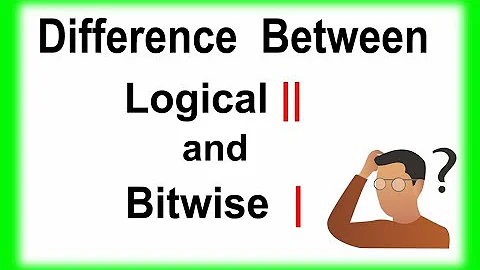Logical vs bitwise
Solution 1
Logical operators operate on logical values, while bitwise operators operate on integer bits. Stop thinking about performance, and use them for they're meant for.
if x and y: # logical operation
...
z = z & 0xFF # bitwise operation
Solution 2
Bitwise = Bit by bit checking
# Example
Bitwise AND: 1011 & 0101 = 0001
Bitwise OR: 1011 | 0101 = 1111
Logical = Logical checking or in other words, you can say True/False checking
# Example
# both are non-zero so the result is True
Logical AND: 1011 && 0101 = 1 (True)
# one number is zero so the result is False
Logical AND: 1011 && 0000 = 0 (False)
# one number is non-zero so the result is non-zero which is True
Logical OR: 1011 || 0000 = 1 (True)
# both numbers are zero so the result is zero which is False
Logical OR: 0000 || 0000 = 0 (False)
Solution 3
Logical operators are used for booleans, since true equals 1 and false equals 0. If you use (binary) numbers other than 1 and 0, then any number that's not zero becomes a one.
Ex: int x = 5; (101 in binary) int y = 0; (0 in binary) In this case, printing x && y would print 0, because 101 was changed to 1, and 0 was kept at zero: this is the same as printing true && false, which returns false (0).
On the other hand, bitwise operators perform an operation on every single bit of the two operands (hence the term "bitwise").
Ex: int x = 5; int y = 8; printing x | y (bitwise OR) would calculate this:
000101 (5)| 1000 (8)
-----------
= 1101 (13)
Meaning it would print 13.
Related videos on Youtube
I159
Updated on July 09, 2022Comments
-
 I159 almost 2 years
I159 almost 2 yearsWhat the different between logical operators
and,orand bitwise analogs&,|in usage? Is there any difference in efficiency in various solutions? -
mac over 12 yearsOn the performance issue: normally the difference between these low-level operations impacts on the overall performance of the program in the order of 10**6 or more iterations. If you (OP!) need to perform that operation that many times, chances are you should switch altogether to a numeric/scientific library like numpy/scipy.
-
user1066101 over 12 yearsOn the performance issue. Since
andandorare "short-circuit" operators that work left-to-right, you'll find thata and (something hellishly expensive)runs completely differently froma & (something hellishly expensive)whenais False. Short-circuit evaluation isn't a negligible effect at all. It's profound. -
 Peter Cordes about 2 yearsA good example would be
Peter Cordes about 2 yearsA good example would be2 & 1producing (integer)0, because their set bits don't intersect. But2 && 1is (boolean)truebecause(2 != 0) && (1 != 0)istrue && true. That's important for understanding that&isn't a drop-in replacement except for not short-circuiting. -
 Peter Cordes about 2 yearsI don't think
Peter Cordes about 2 yearsI don't think1011 && 0000is a very good illustration because it's 0 or false with & or &&. (In like C++, even the type is different:&&produces abool,&produces an integer of the type of the inputs. If Python has a bool type, I'd assume it's like that.) -
 Abu Shoeb about 2 years@PeterCordes thanks for pointing out a better example in your comment. I guess this can be added to the answer too.
Abu Shoeb about 2 years@PeterCordes thanks for pointing out a better example in your comment. I guess this can be added to the answer too.







